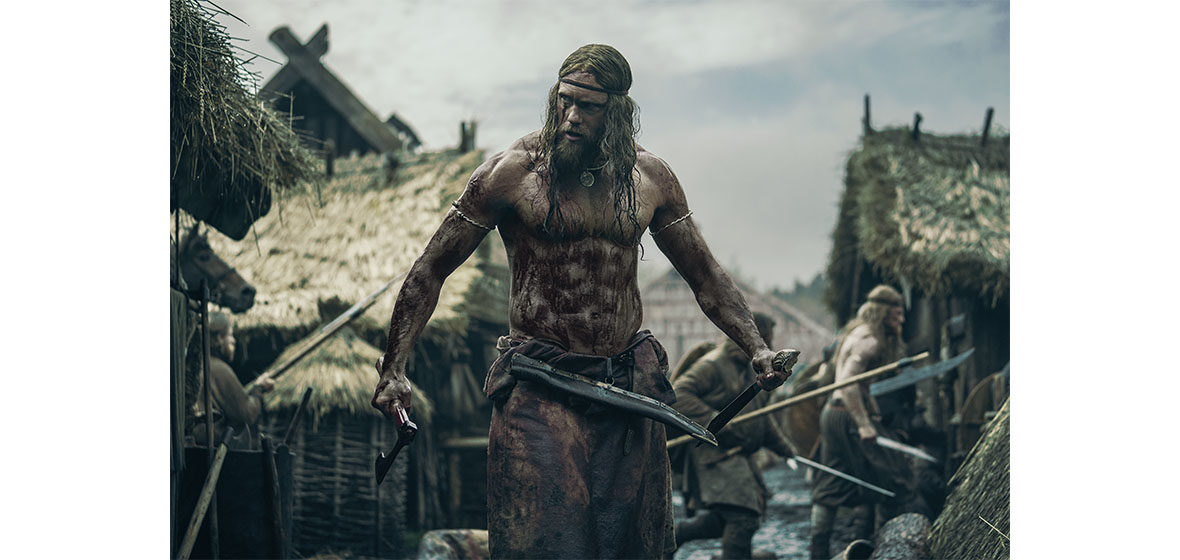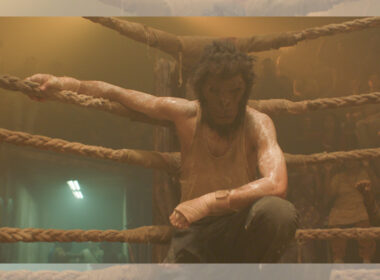Rating: ****
Robert Eggers’s third feature is familiar to those who followed his work but a curious departure from his style. From The Vvitch and The Lighthouse, he continued to develop his theme of the different levels where we find toxicity in the patriarchy of the Western/Northern-European catholic culture. While his first two films had an exciting experimental flare to his narrative, The Northman is, beat by beat, traditional, modern storytelling. I understand to tell a story about Vikings from the X century, and he channelled the style and form of Nordic folklore. In a way, The Northman is Eggers’ most approachable and entertaining film – and that is by design, not necessity.
The story is straightforward, very Shakespeare – which is unfair, as the bard himself was “very Saxon” himself in some of his bloodiest tragedies. Young Prince Amleth (Oskar Novak) witnesses his father, the king Aurvandil (Ethan Hawke), dying from the blade of his uncle Fjölnir (Claes Bang). The young man escapes with the promise to return years later, avenge his father, save his mother (Nicole Kidman), and reclaim his kingdom. And so it goes that decades later, a now beefed up Amleth (Alexander Skarsgård) receives a sign from a blind seeress (Björk) that it’s time to act on the vengeance he has held. With the help of Olga (Anya Taylor-Joy), a Slavic slave, Amleth travels to Iceland, where Fjölnir sets up a new chieftaincy. Carefully and almost sadistically, he acts on his plan to first torment and curse his uncle and, in a sea of blood, guts and dismembered limbs behind him, get closer to his vengeance.
It’s easy to compare it to Hamlet (similar name, similar theme), but let’s be honest, that’s the kind of traditional tragic affair even before the Greeks were chatting about Oedipus. The Northman holds that DNA in the hilt of his sword, deflecting comparisons to Shakespeare by being so unapologetically Northern European. If you have read the Saga of the Volsungs, you know what he’s reaching for here. It helped that it recruited the words of Icelandic poet/novelist Sjón; the film feels like a tragic folklore tale that survived centuries of the spoken-word tradition. None can accuse Eggers of not being a perfectionist of formula.
Representing toxic masculinity in Viking culture is low-hanging fruit, though. That chauvinist types have appropriated their symbols and Gods is apparently one of the reasons why Eggers was reluctant to make this film until he found a way around it. What’s the first thing you think when you think of Vikings? Pillaging, primitive, barbaric men with protruding muscles and a penchant for brutish violence. It’s fertile ground for a filmmaker who previously looked at the destructive power of patriarchy in religion, followed by the destructive power of the patriarchal nature. Here he goes straight to the core – these Vikings are dedicated men who devolve into animals when they hear the call to battle. Right at the start, in a ceremony to turn the young Amleth into men, he and his father grunt, walk and howl like feral dogs. Later, an adult Amleth leads a group to destroy and pillage a village as if they are wolves.
The comparison is interesting, and I like that we never see Amleth regaining any humanity. He falls in love and bears witness to betrayal. He gains a lyrical spirituality and is faced with love and comfort, yet vengeance consumes him so much, it stops him from becoming a man. Part of his plan to torment Fjölnir is so his uncle can also be reduced to the same level of primal behaviour.
As curious as that is, I don’t know if what he was trying to say always works. He positions their customs as part of their context that we cannot judge, and I agree. At the moment, someone comments on the barbarism of Catholicism (“Their God is a dead body stuck to a tree”), but the idea doesn’t develop past these first thoughts. We have the typical Eggers’ connection to mysticism – I like how every God exists in his work – and the end has this epic beauty that takes the idea that vengeance is within us to be acted on as absolute truth. And while I don’t necessarily agree with the thought, it does give wrap the film in a catharsis.
The Northman is what we always dreamed adult blockbusters could be. It’s violent, graphic, and brutal. It’s unbashful entertainment, but there’s not much it can say beyond the pulsating blood pumping in its veins. Skarsgård is the kind of hero we like and rarely get to see – boorish in how he behaves and how he waddles like he’s trying to balance all those muscles and that hatred. I don’t know what Olga sees in him beyond knowing he can protect her and help her escape; I mean, I struggle to think what they have to talk about to each other. Kidman wasn’t biting for the most part until her brutal monologue at the end when I suddenly got it; she’s in performative tragedy mode, and it’s pretty compelling.
All in all, it’s a good movie. It won’t stay with you months after you watch it, but good films don’t need a bigger truth but to be true to themselves.




